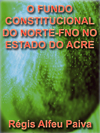
O FUNDO CONSTITUCIONAL DO NORTE-FNO NO ESTADO DO ACRE: RECURSOS DO POVO, POL?TICA DE ESTADO, BENEF?CIOS DA ELITE
Régis Alfeu Paiva
ABSTRACT
The present work makes an evaluation of the investments of the Constitutional Funds for the North region -FNO -in the State of Acre since its implantation in 1989 to mid2006.
All 17 lines of financing had been analyzed, as much in volume of resources as in amounts of contracts, with the values being statistically correlated to data of the economy and social indicators of the State. The fund only presented correlation to cattle raising, with the volume of investments concentrated in the region less poor of Acre, and the values grouped mainly to the richest layers of that society.The data revealed that FNO took care of the interests of the market logics and not of the development, diminishing the regional differences under a magnified cost of the intra-regional gap.
The mesoregion of the Juruá Valley was harmed in the distribution of the resources.
Moreover, FNO had correlation to the increasing in deforestation for milk production (concentrated in the Valley of Acre), without a meaning of improvements in the social indicators. FNO was the example how the popular resources are used in favor of the ruling class through a policy of State. The Fund was not capable of gearing the local economy, being this fact also credited the development policy, which the focus on the extractivism was not capable of forming a proper consuming market and nor to foment an economy based on exportation.
PAIVA, Régis Alfeu, M.Sc., University Federal of the Acre, de 2007. FNO IN THE
SATE OF ACRE: POPULAR RESOURCES (FUNDS); POLICY OF STATE; BENEFITS OF THE ELITE. Orientador: Francisco Carlos da Silveira Cavalcanti.
.Um político que se decide por um plano de desenvolvimento sem possuir informações suficientes sobre a situação social é pouco mais que um truão, quando não um celerado.
(Umberto Eco, 1977, p. 26).
